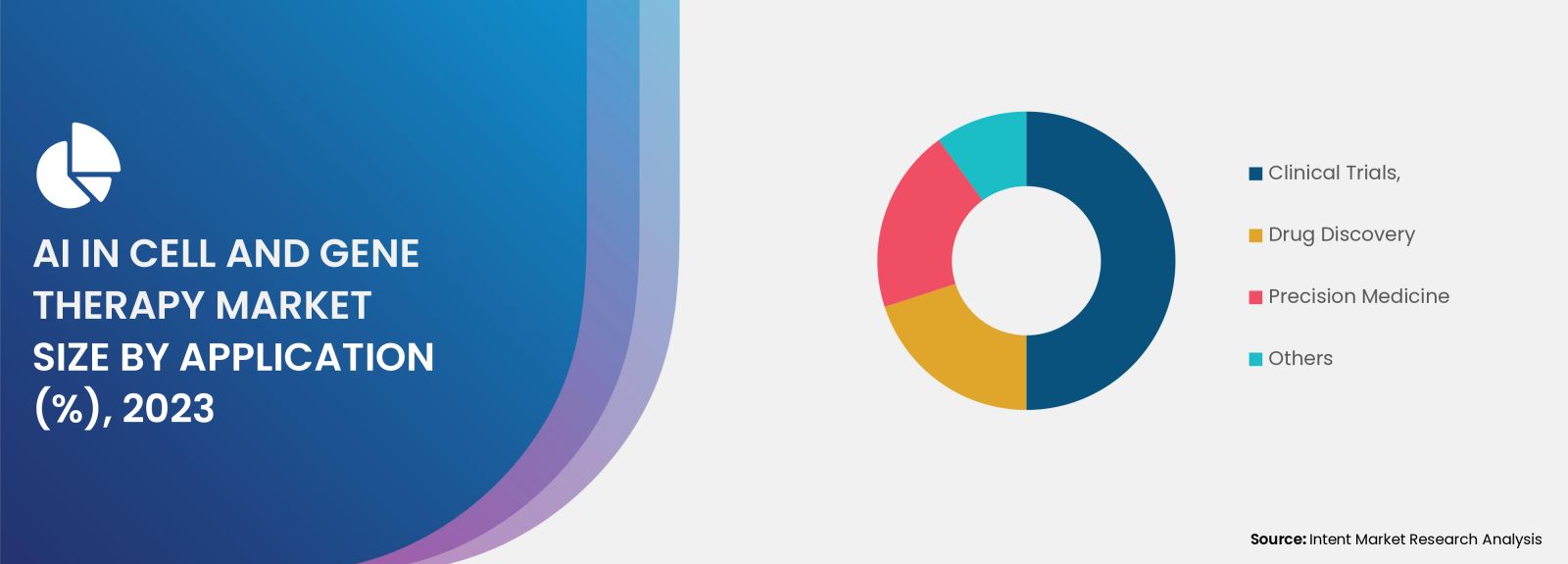sales@intentmarketresearch.com
+1 463-583-2713
High Potential of AI Technology in Genomics and Drug Discovery is Projected to Drive AI in Cell And Gene Therapy Market
AI is revolutionizing cell and gene therapy (CGT) by expediting drug discovery, optimizing treatment customization, and enhancing manufacturing processes. This transformative synergy between AI and CGT holds the promise of personalized medicine, reshaping the landscape of healthcare with more efficient and precise interventions, ultimately improving patient outcomes.
The CGT market is witnessing a surge in investments and partnerships driven by the integration of AI technologies. Pharmaceutical companies, biotech firms, and research institutions are collaborating to harness the power of AI in advancing cell and gene therapies. As the synergy between AI and CGT continues to evolve, it holds the promise of unlocking unprecedented therapeutic potentials. For instance, Généthon, which carries out gene therapy R&D for rare genetic diseases, and Thales, a European artificial intelligence specialist, are working together to develop digital models for improving gene therapy bioproduction yields.
Companies, like WhiteLab Genomics, propel AI-driven CGT, securing substantial investments for advancement
Companies are actively securing investments to advance their presence in the AI-driven cell and gene therapy market. For instance, WhiteLab Genomics has successfully secured $10 million in funding through a recent investment round. The primary investors in this round were Omnes Capital, a prominent French venture capital firm, and Debiopharm, a Swiss-based biopharmaceutical company with a strong emphasis on digital health. WhiteLab Genomics is on a mission to transform the field of genomic therapy development by harnessing both public and private data sources and utilizing their in-house AI algorithms.
AI's influence on CGT: Navigating healthcare data challenges and embracing collaborative market strategies
One of the main factors influencing the use of AI in CGT is the creation of massive and intricate healthcare databases. An abundance of data is available for analysis due to the growing digitization of medical records, genomic sequencing data, and other healthcare information. These datasets can be effectively processed and mined for insightful information by AI and ML algorithms.
AI plays a key role in unlocking the potential of these enormous healthcare datasets by assisting in the identification of patterns, biomarkers, and genetic variations that guide treatment decisions. Major market players in CGT sector are adopting collaboration and partnerships strategies to gain market share. However, increasing complexities, data breaches, and concerns about data privacy are hindering market growth.
Harnessing deep learning and generative AI for enhanced analysis and optimization
In CGT, deep learning is utilized for image analysis, pattern recognition, and predictive modeling, aiding in tasks such as identifying cellular structures and predicting treatment responses. ML algorithms in CGT contribute to data analysis, and decision support systems. These algorithms can process large datasets to identify potential therapeutic targets, predict patient responses, and optimize treatment strategies based on individual patient characteristics. In CGT, generative AI can be applied to design novel therapeutic molecules, optimize genetic sequences, or generate synthetic datasets for training AI models.
AI's impact on clinical trials, manufacturing, and development efficiency
Clinical trials application segment has dominated the AI in CGT market. AI models contribute to the identification of novel candidate molecules, streamlining the design and discovery of gene and cell therapies. Through predictive modeling and simulation, researchers can assess the efficacy and safety of potential interventions before they enter the clinical trial phase, thereby reducing development timelines and minimizing costs.
Furthermore, AI technologies are instrumental in the automation and improvement of manufacturing processes for cell and gene therapies. Precision and efficiency in the production of therapeutic cells or vectors are essential for the scalability and accessibility of these treatments.

Latin America cell & gene therapy market is expected to witness substantial growth as AI is increasingly being utilized to analyze vast datasets related to genetic information, patient profiles, and treatment outcomes. This data-driven approach allows for more personalized and targeted therapies, optimizing the effectiveness of cell and gene treatments. Furthermore, AI algorithms play a crucial role in identifying potential candidates for cell and gene therapies, aiding healthcare professionals in selecting the most suitable patients for these advanced treatments. In the region, the integration of AI is expected to play a pivotal role in accelerating the pace of innovation and improving patient outcomes in the rapidly evolving field of CGT.
Competitive Landscape
The key players in the AI in CGT market are Dyno Therapeutics, Exelixis, Form Bio, Généthon, DeepMind (Google), IBM, Insilico, Microsoft, Nosis Bio, Oxford BioMedica, SK Pharmteco, Thales. Increasing number of mergers and acquisitions and the funding activities gives new potential to market growth. For instance, In September 2022, WhiteLab Genomics raised USD 10.0 million for AI-powered genomic therapies platform.
Available Formats



